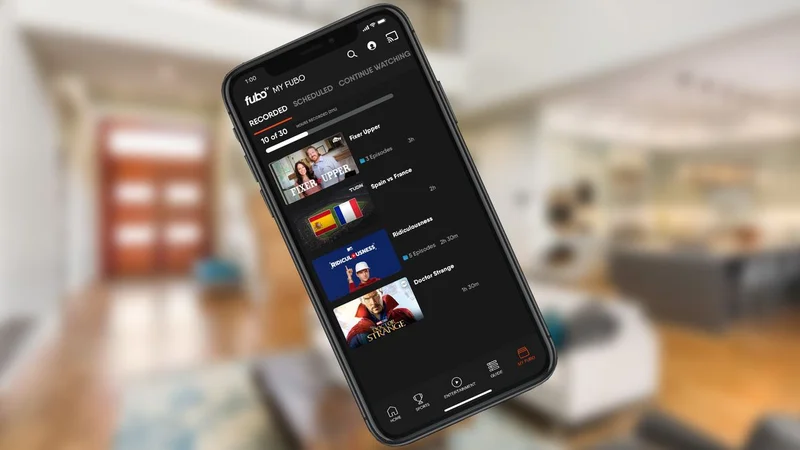FuboTV by the Numbers: Price vs. Channels vs. The Competition
# The FuboTV Data We Can't See: A Ghost in the Streaming Machine
I sat down this morning to do what I always do: cut through the noise. The target was the streaming wars, a sector fueled by a dizzying mix of high-growth narratives and high-cost realities. My specific focus was FuboTV, the sports-centric service that has always struck me as a high-wire act. There was a fresh data set I was ready to dissect, a source promising a clearer picture of its standing against giants like YouTube TV and Hulu.
Then, I hit a wall. Not a paywall, but a digital void. The page returned an `ERR_SOCKET_NOT_CONNECTED`. The data was simply… gone.
For most people, this is a momentary annoyance. A broken link. But for an analyst, it’s something more. The cursor blinked on the sterile white of the error page, a rhythmic, digital pulse against a backdrop of silence. That blinking cursor felt like a perfect metaphor for the entire streaming industry: a signal that’s supposed to illuminate, but instead just highlights a vast, frustrating darkness. This isn't just about a missing article; it's about the systemic opacity we're forced to accept in a multi-billion-dollar industry.
The Signal and the Noise
Let’s be clear: getting reliable, apples-to-apples data on streaming services is notoriously difficult. These companies are masters of the narrative. They release subscriber numbers when they’re favorable and pivot to "engagement metrics" when they’re not. They talk about Average Revenue Per User (ARPU) but are less forthcoming about the ever-escalating costs of content, particularly live sports, that erode their margins. The whole ecosystem—from `Sling TV` to `Hulu Live TV` to `YouTube TV`—operates in a state of managed transparency.
This is what makes third-party analysis so critical. We rely on these intermittent flashes of light to build our models and test the corporate story. Was the inaccessible report going to show that the latest `FuboTV cost` increase was finally starting to crater its subscriber base? Or was it going to reveal a surprising resilience, suggesting they’ve carved out a durable niche of sports fanatics willing to pay a premium? We don’t know. And that’s the problem.

The competition is a zero-sum game of household budgets. A dollar spent on a `FuboTV subscription` is a dollar not spent on something else. This makes the silence around key metrics all the more deafening. It’s like trying to analyze a poker game where the house only shows you the winning hands. You see the successes, but the losses, the bluffs, and the near-misses are all obscured. How can you accurately assess the skill of a player if you can’t see the cards they folded?
A Case Study in Opacity
Let's hypothesize what this missing data on FuboTV might have contained. Fubo’s business model is a fascinating and precarious one. It has differentiated itself with a deep roster of sports channels (its core value proposition), but this comes at a staggering cost for content rights. Unlike a service like Netflix, which owns more and more of its own content, Fubo is largely at the mercy of leagues and media conglomerates. Its stock (`FUBO`) has been on a rollercoaster for years, reflecting this fundamental tension and reacting to news like the recent FuboTV Shareholders Approve Disney Streaming Deal - The Wall Street Journal. The market can’t seem to decide if it’s the future of sports media or a business model on a treadmill to oblivion.
The company’s reported subscriber growth was about 15% year-over-year in its last filing—to be more exact, 14.7% for its North American segment. But subscriber count is only one part of the equation. The more important, and often more hidden, numbers are churn (how many subscribers cancel), and subscriber acquisition cost (SAC). Did the missing report have a fresh analysis of Fubo's churn rate post-price hike? Did it have data suggesting its SAC was climbing as it fights behemoths with marketing budgets that dwarf its entire market cap?
I've been tracking these streaming services since their inception, and the lack of standardized reporting on these key performance indicators is a persistent source of frustration. FuboTV's reliance on sports (a notoriously expensive and complex web of broadcasting rights) makes its financial health particularly opaque. We know the `FuboTV price` has gone up, but we have a much fuzzier picture of the unit economics behind each subscriber.
This is the kind of granular detail I was hoping to find. Instead, the void. It forces us back to the same fundamental questions. Is a sports-first streaming service a viable long-term business, or is it a feature that a larger company like Apple or Google will eventually absorb for a fraction of its peak valuation? Without consistent, verifiable data, how can anyone make a rational decision?
The Error Message Is the Message
In the end, the `ERR_SOCKET_NOT_CONNECTED` told me more than the article itself might have. It’s a stark reminder that in the modern information economy, access is fragile and data is often curated. The absence of information is, itself, a data point. It speaks to the volatility and the uncertainty that are the true hallmarks of the streaming wars. We are all navigating by ghost signals, trying to piece together a coherent picture from incomplete, and sometimes disappearing, fragments. The real risk isn't just betting on the wrong company; it's operating in a market where you can't even get the data you need to know you're wrong.
Tags: fubotv
The Aster DEX: What It Is and the Future It’s Building
Next PostPLUG Stock's Sudden Rally: What the News and Price Action Really Mean
Related Articles
